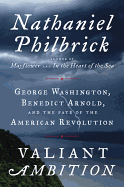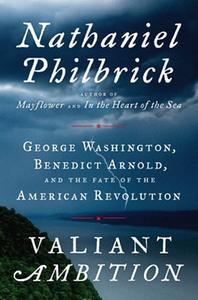
 The name "Benedict Arnold" is synonymous with "traitor" today, but it wasn't always. Before Arnold began selling crucial information to the British military during the American Revolution, he was a charismatic general, a colleague of George Washington and a staunch believer in the colonists' cause. Nathaniel Philbrick (Bunker Hill; In the Heart of the Sea) delves into the uncertain early years of the war and traces Arnold's journey from hero to turncoat in Valiant Ambition.
The name "Benedict Arnold" is synonymous with "traitor" today, but it wasn't always. Before Arnold began selling crucial information to the British military during the American Revolution, he was a charismatic general, a colleague of George Washington and a staunch believer in the colonists' cause. Nathaniel Philbrick (Bunker Hill; In the Heart of the Sea) delves into the uncertain early years of the war and traces Arnold's journey from hero to turncoat in Valiant Ambition.
Philbrick is known for his vivid, compelling explorations of crucial episodes in American history. Valiant Ambition covers more ground--physical and temporal--than some of his earlier books, dealing with a four-year span (1776-1780). The narrative draws together detailed accounts of several battles, the constantly shifting politics of both the American and British military commands, the infighting and debate among members of the Continental Congress and the roles played by Arnold and his commander-in-chief, George Washington.
Philbrick plunges readers into the chaos of a new, untried country, whose military leaders struggled to unite the groups of inexperienced militiamen under their command. As the colonial army battled the British army in the dense forests of upstate New York, the Continental Congress remained in Philadelphia, arguing about finance, foreign policy and other issues. Bold and impatient, Arnold longed to capitalize on his past battlefield successes, but grew frustrated when he was passed over repeatedly for promotion.
The sheer number of personalities, battle tactics and other details threatens to bog down the narrative at first, but Philbrick's account picks up speed once Arnold begins trading secrets with the British. A cast of colorful supporting characters, such as Arnold's co-conspirator Major John André and colonial soldier Joseph Plumb Martin (who exhibits a Forrest Gump-like talent for ubiquity), rounds out the drama.
After more than 200 years of telling and retelling, Arnold's story and the players in it are often reduced to simple, almost mythical archetypes. But Philbrick treats his subjects with respect, painting complex portraits of historical figures who were real--and flawed--people. The fluctuating landscapes of loyalty and betrayal, the constant tug of self-interest and the question of how best to govern a new nation provide nuance and depth. (Philbrick's depiction of the Continental Congress as "stuck in the old familiar rut of partisanship and indecision" may ring uncomfortably familiar today.) Though Arnold did in fact betray his comrades, Philbrick's account sheds new light on his motivations and the struggles faced by the leaders and citizens of a brand-new nation. --Katie Noah Gibson, blogger at Cakes, Tea and Dreams
Shelf Talker: Historian Nathaniel Philbrick paints a complex, nuanced portrait of Benedict Arnold and the early days of the American Revolution.

